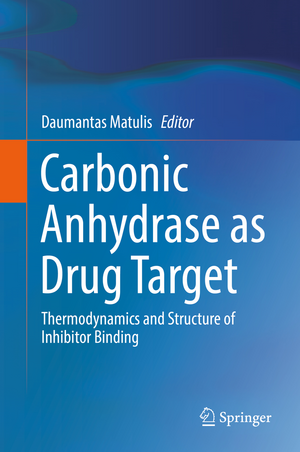Carbonic Anhydrase as Drug Target: Thermodynamics and Structure of Inhibitor Binding
Editat de Daumantas Matulisen Limba Engleză Hardback – 3 iun 2019
Preț: 700.79 lei
Preț vechi: 737.68 lei
-5% Nou
Puncte Express: 1051
Preț estimativ în valută:
134.10€ • 146.12$ • 112.100£
134.10€ • 146.12$ • 112.100£
Carte tipărită la comandă
Livrare economică 19-25 aprilie
Preluare comenzi: 021 569.72.76
Specificații
ISBN-13: 9783030127787
ISBN-10: 3030127788
Pagini: 450
Ilustrații: XXVI, 353 p. 169 illus., 107 illus. in color.
Dimensiuni: 155 x 235 mm
Greutate: 0.89 kg
Ediția:1st ed. 2019
Editura: Springer International Publishing
Colecția Springer
Locul publicării:Cham, Switzerland
ISBN-10: 3030127788
Pagini: 450
Ilustrații: XXVI, 353 p. 169 illus., 107 illus. in color.
Dimensiuni: 155 x 235 mm
Greutate: 0.89 kg
Ediția:1st ed. 2019
Editura: Springer International Publishing
Colecția Springer
Locul publicării:Cham, Switzerland
Cuprins
Final ToC tbd. 1) Description of human carbonic anhydrases (12 catalytically active human isoforms; isoforms as drug targets, enzymatic activity, catalytic mechanism, thermodynamics of protonation of the water molecule in the active site).- 2) Thermal stabilities of all isoform CA catalytic domains.- Thermodynamics of inhibitor binding to CAs (incl. intrinsic thermodynamics - not mentioned important subject in most CA literature).- 3) Comparison of methods to determine inhibitor binding to CAs (ITC, FTSA, enzymatic activity assays).- 4) Chemical synthesis of CA inhibitors.- 5) X-ray crystallographic structures of CAs and their complexes with inhibitors.- 6) Antibodies against CAs.
Notă biografică
Prof. Dr. Daumantas Matulis
Vilnius University
Life Sciences Center
Institute of Biotechnology
Department of Biothermodynamics and Drug Design
Sauletekio 7, 10257 Vilnius
Lithuania
Vilnius University
Life Sciences Center
Institute of Biotechnology
Department of Biothermodynamics and Drug Design
Sauletekio 7, 10257 Vilnius
Lithuania
Textul de pe ultima copertă
This book offers deep insights into the thermodynamics and molecular structures of the twelve catalytically active isoforms of human carbonic anhydrase (CA) with a particular focus on inhibitor binding for drug design. X-ray crystallographic structures in combination with enzyme kinetic testing provide information on the interaction of CAs and their inhibitors, knowledge which is crucial for rational drug design. CAs are zinc carrying enzymes that catalyse the reversible interconversion of carbon dioxide and bicarbonate and are involved in numerous cellular processes. They are therefore a common target for drugs. The suppression of CA activities through inhibitory compounds has found application for example in diuretics and in glaucoma therapy. In this book methods used to determine binding thermodynamics of inhibitory compounds (Isothermal titration calorimetry, Fluorescent thermal shift assay/differential scanning fluorimetry and others) will be compared in detail. Also typesand chemical synthesis of CA inhibitors, the use of antibodies against CAs as well as inhibitor application in animals are discussed.
Caracteristici
Numerous X-ray crystallographic structures of human carbonic anhydrases and their complexes with inhibitors Compares methods to determine inhibitor binding Provides information on intrinsic thermodynamics of inhibitor binding to carbonic anhydrases
